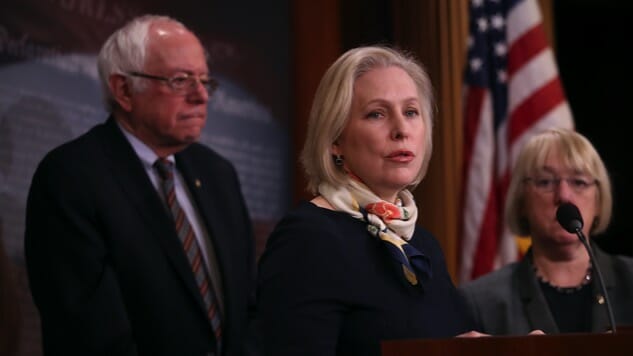Single-Payer or Bust: The Democrats Need to Give Us Something to Vote For
Photo by Justin Sullivan
“Since when do Democrats attack one another on universal health care? I thought we were trying to realize Harry Truman’s dream. I thought this campaign finally gave us an opportunity to put together a coalition to achieve universal health care.”
That was Hillary Clinton, in the heat of her 2008 primary battle with then-Senator Barack Obama.
Obama, Clinton suggested, was committing a shameful act of friendly fire by sending around fliers that misled voters on health care and other topics around which Democrats should seek to unify.
“This is wrong and every Democrat should be outraged because this is the kind of attack that not only undermines core Democratic values,” Clinton said, “but gives aid and comfort to the very special interests and their allies in the Republican Party who are against doing what we want to do for America.”
How quickly things change.
In 2016, confronting yet another unexpected challenge in the person of Vermont Senator Bernie Sanders, Clinton trampled on what appeared, in February of 2008, to be a statement of principle.
Previously an outspoken proponent of single-payer health care, Clinton, speaking at a campaign rally early last year, painted Sanders’ “Medicare for all” proposal as pie in the sky.
“I wish that we could elect a Democrat who could wave a magic wand and say, ‘we shall do this and we shall do that.’ That ain’t the real world we’re living in!” Clinton said.
But the former Secretary of State didn’t stop at dismissing Sanders’ proposal as unrealistic; she insisted that, if it was enacted, it would dismantle the progress made by Obamacare and “send health insurance to the states, turning over your and my health insurance to governors.”
Chelsea Clinton, adding to the concentrated barrage of attacks, pursued a similar line during a speech in New Hampshire, arguing that Sanders’ plan to replace the Affordable Care Act with a single-payer program could “strip millions and millions and millions of people of their health insurance.”
These claims, as everyone who examined them at the time recognized, amounted to little more than the smears Clinton decried eight years prior.
-

-

-

-

-

-

-

-

-

-

-

-

-

-

-

-

-

-

-

-

-

-

-

-

-

-

-

-

-

-

-

-

-

-

-

-

-

-

-

-








































